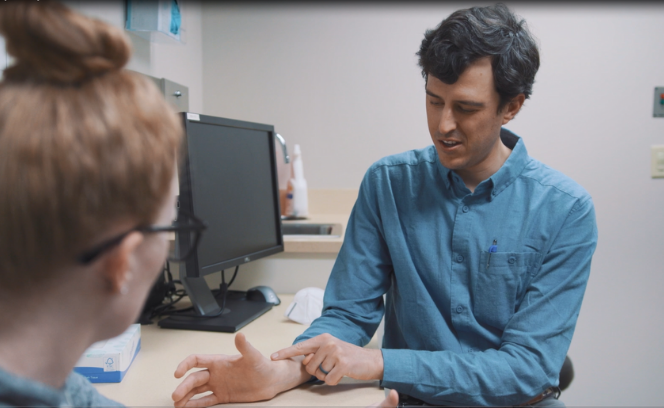
The shoulder is an area comprised of several joints that are made up of three bones and multiple muscles, tendons, and ligaments. This complex structure is the most mobile joint in the human body. The shoulder provides us with a tremendous range of motion; from scratching our backs to throwing the perfect pitch. Proper function of our shoulders is essential for most of our daily activities. More than four million patients seek medical attention for shoulder injuries each year, suggesting shoulder pain is one of the largest orthopedic problems in the U.S. Here are some of the most common reasons our doctors see patients for shoulder pain.
Bursitis
Bursae are small, fluid-filled sacs that provide cushioning in joints throughout the body, including the shoulder. Bursitis is a condition caused by inflammation of one or both of the bursae between the rotator cuff and part of the shoulder blade (acromion). Excessive use, long periods of pressure on the joint, gout, and trauma are all common causes of bursitis. Many tissues of the shoulder become inflamed and painful with this condition, and patients may have stiffness, swelling, and/or redness. Daily activities such as washing your hair or getting dressed may become painful.
Impingement (Rotator Cuff Tendonitis)
Shoulder impingement, also known as rotator cuff tendonitis, occurs when the tendons of the rotator cuff become compressed against the shoulder blade. Often caused by overuse of the shoulder, this condition is common in athletes such as tennis players, rowers, swimmers, or weight lifters. Impingement is also commonly seen in those with occupations that require repetitive overhead motion, such as painting or construction. Patients usually experience swelling and tenderness in the front of the shoulder, pain and stiffness when raising the arm, loss of strength or range of motion, and difficulty doing everyday activities.
Rotator Cuff Tear
The rotator cuff contributes to the stability of the shoulder and is formed of tendons attached to the upper arm bone, and their four major muscles. When these tendons split or tear, they begin to pull away from their attachment to the bone. This can result from a sudden direct injury, degenerative conditions such as arthritis, or long-term overuse. Patients often experience pain or weakness when lifting/lowering the arm, a limited range of motion, and can hear clicking or popping. Shoulder pain can be constant, even when you are at rest and not using the joint.
Dislocation (Shoulder Instability)
The shoulder joint is described as a ball and socket joint. The “ball” component is made up of the head of the upper arm bone (humerus), and the “socket” component is made up of the outer portion of the shoulder blade (scapula). When the ball slips out of the socket, your shoulder has been dislocated. Dislocations can be partial or complete. This can happen as a result of a sudden injury, or from long-term overuse. Once the ligaments, tendons, and muscles around the shoulder become looser, dislocations can occur repeatedly. A dislocated shoulder causes pain, and often an inability to move the shoulder. Other symptoms can include swelling, bruising, a visible bump under the skin, and numbness or tingling.
Osteoarthritis
There are many types of arthritis. Osteoarthritis is an age-related “wear and tear” type of arthritis. The cartilage that cushions the bones in the shoulder wears away over time, and the bones start to rub against one another. This can cause stiffness and pain, swelling, and a loss of range of motion that often begins during middle age. Osteoarthritis develops slowly and usually worsens over time. Depending on how your osteoarthritis is affecting your daily life, you may consider having shoulder replacement surgery.
If your pain is caused by a sudden acute injury, seek medical care as soon as possible. If your pain is less severe and occurs over time, it may be safe to see if time and rest will resolve the problem. If your symptoms persist, schedule an appointment with your orthopedic surgeon. Your doctor will conduct a thorough evaluation to determine the cause of your shoulder pain and come up with an individualized treatment plan. Many conditions can be treated conservatively without surgery – with activity changes, anti-inflammatories, physical therapy, or other options.





